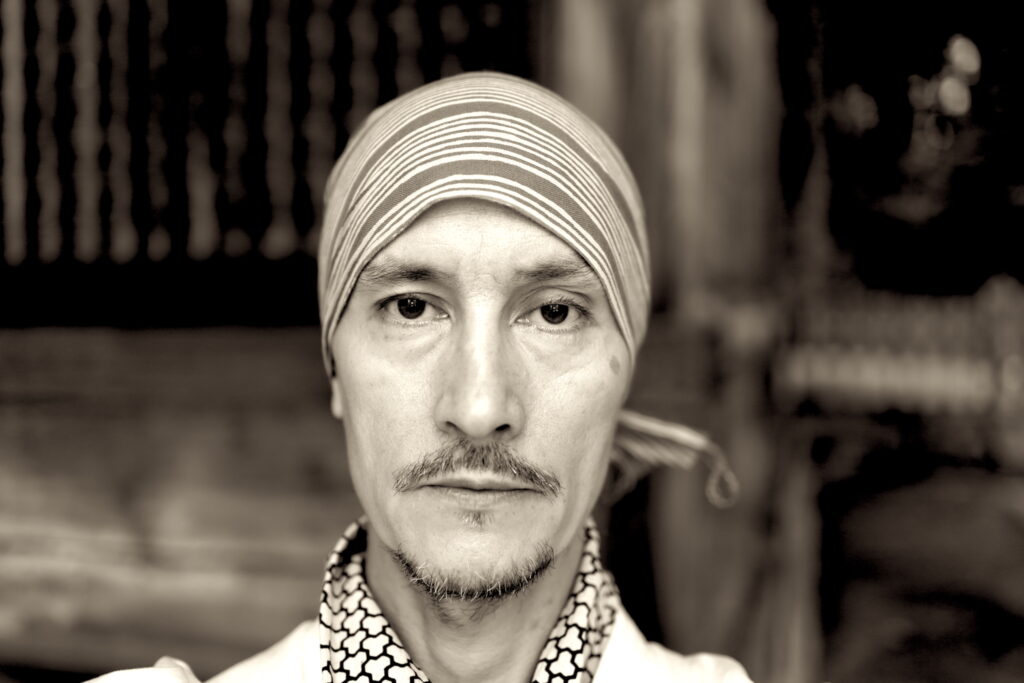Passion for swords was perhaps inherited from my father, a martial artist, sword collector and connoisseur. During my childhood he held annual sword appraisal gatherings, as well as published a book on the subject. Through him I met Mukansa sword-smith Matsuba Kunimasa, under whom I apprenticed to become a Japanese sword-smith.
To become a licensed Japanese sword-smith you must be accepted by, and serve full time as an apprentice under a licensed master for a minimum of five years. After the completed training you must pass an intense eight days national examination, organized by the governmental institution The Ministry of Cultural Affairs. Where upon you must produce a wakizashi, according to traditional methods.
After the perseverance of apprenticeship starts the real struggle. To survive as a professional swordsmith.
I live at my workshop, and work ardently seven days a week. So, what makes it worthwhile to meticulously craft an object by pre-industrial methods, considered by some to be of no use in modern society. And the question seems to prevail, what is a Japanese sword even? A weapon? A piece of art? Or a spiritual symbol? After the world war, to preserve the legal right to resume the banned craft of the Japanese sword, there was a necessity to emphasize the artistic dimension, but truly, the sword is an amalgam of it all.
According to my observation, a major utility of the sword was, and still is, to serve as a source of inspiration, and symbol of self-mastery. For the rulers of the past, the warrior class, virtues like courage, nobility and righteousness was surely highly regarded, as well as the power of self-control attained through awareness of ones darker shadows. All desired qualities for a possessor of weapons, with the right to judge over life and death of a commoner, opponent or foe. Qualities expressed in a masterly crafted sword.
A properly made sword is designed as a natural extension of your body, and to manoeuvre such power tool, provokes a sense of possessing a super power. It may stimulate a benevolent, or destructive temperament. Through practicing the art of drawing and swinging a sword correctly, you develop discipline of your mind. A discipline that ultimately may function to uncover the stillness behind the illusion of the mind. In this way, the sword is a weapon not against an external enemy, but may aid in the ability to acknowledge ones shadows. As a weapon against malevolent demons, on the internal battlefield of heart and mind.
By using the sword as a tool for self inquiry, and letting oneself get influenced by its mysterious beauty.
Observing how by studying the intricacies of its refined essence, and complex nature, it may fine-tune and cultivate perception. How does this beauty occur in this contradictory tool? Designed to withstand the impact of cutting through bone, yet painstakingly sculpted to convey elegance. With a polished surface so fine, that even a speck of dust may ruin its silky finish.
A hyper masculine object built for performance. Yet it should remain still, in its feminine, protective shell.
This envelopes the lethal weapon with an air of a delicate nature, and may inspire the warrior to initially seek the more sophisticated solution of diplomacy, rather than instantly unsheathing his deadly sword.
It reminds you of the necessity to refine your primitive powers. But also, that even the most refined qualities, ought to retain the roots to its raw perhaps dangerous shadow. To posses power requires mastery of your darker nature, true for warriors or rulers of any kind. This makes the sword a suitable symbol of self-mastery, and the transcendence of ego. This dimension of the sword enthralled me, and spur me to pursue a perhaps perpetual research, with an aspiration to create a sword that posses the power to inspire. That bring forth your most noble qualities, and could serve as a talisman. A talisman that by virtue of its mysterious beauty, may bring you in touch with, and protect the unconditioned, pure state beyond your mind.

Name: Yasha Yukawa. Swordsmith name: Kagami Yashamaro
TRAINING / 2009-2016
GRADUATION / 2016
2016-Present
Exhibition / 2018
Sword Competition / 2020
Sword Competition / 2021
2022
2023
